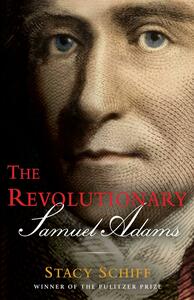Take a photo of a barcode or cover
challenging
informative
slow-paced
There's a difference between being a Founder and a Revolutionary. Samuel Adams was definitely the latter, but he left most of the founding to his more famous second cousin, John. And Stacy Schiff's excellent biography tells us that while revolution-making might sound like more fun than the founding stuff, it's certainly a lot more dangerous.
For the first half of the 1770s, Adams was the unquestioned insurrection leader. King George certainly though so. It was Adams he most wanted to see dangling by the neck on a British hill. Schiff will keep you turning pages as she details the thrilling derring-do that led to the declaration-writing and nation-building. And the story echoes in today's media universe. Adams was well ahead of his time in his mastery of mass communication and the impact of the symbolic. From naming the "Boston Massacre" to dressing a group of colonists as Native Americans for some serious tea dumping, Adams engineered a popular uprising that eventually led to a "united" states, which Schiff reminds us was no tea party in itself.
If you're familiar with Schiff's "The Witches," you're well aware of her remarkable storytelling skills, even when the story contains the actions of multitudes, whether it's hysterical, tragic witch hunting or fomenting revolution. And Adams isn't the easiest of subjects. We learn a lot about his actions, but it's harder to know his personal life. He doesn't seem to have stopped running long enough to put his inner thoughts down on paper. Schiff makes a heroic effort, but Adams' family and his feelings about them often gets lost in the fog of revolution.
Although he wasn't much of a brewer (and he hated to be called "Sam"), Schiff's great and immensely readable book recounts the saga of a irreplaceable patriot.
For the first half of the 1770s, Adams was the unquestioned insurrection leader. King George certainly though so. It was Adams he most wanted to see dangling by the neck on a British hill. Schiff will keep you turning pages as she details the thrilling derring-do that led to the declaration-writing and nation-building. And the story echoes in today's media universe. Adams was well ahead of his time in his mastery of mass communication and the impact of the symbolic. From naming the "Boston Massacre" to dressing a group of colonists as Native Americans for some serious tea dumping, Adams engineered a popular uprising that eventually led to a "united" states, which Schiff reminds us was no tea party in itself.
If you're familiar with Schiff's "The Witches," you're well aware of her remarkable storytelling skills, even when the story contains the actions of multitudes, whether it's hysterical, tragic witch hunting or fomenting revolution. And Adams isn't the easiest of subjects. We learn a lot about his actions, but it's harder to know his personal life. He doesn't seem to have stopped running long enough to put his inner thoughts down on paper. Schiff makes a heroic effort, but Adams' family and his feelings about them often gets lost in the fog of revolution.
Although he wasn't much of a brewer (and he hated to be called "Sam"), Schiff's great and immensely readable book recounts the saga of a irreplaceable patriot.
I listened to the audio book and it was extremely hard to get in to. The information was interesting - just the writing was hard sometimes to follow.
Just not in the mood to read about a guy who is described as a principled perosn in favor of democracy, but the description so far pegs him as a jagoff.
challenging
informative
slow-paced
hopeful
informative
reflective
slow-paced
Great view of the build-up to revolution from a Boston perspective. Sam Adams was one of the most famous founding fathers at the time but his reputation has been eclipsed by others that did better at self promotion and continued their role in the new republic. Adams was an exaggerator, a trouble-maker, and at times a straight-up liar for American rights. He was a better revolutionary than a statesman.
Notes:
Notes:
- Poor his whole life
- Fame declined after revolution, unlike the other revolutionaries
- Fame at the time was great. When John Adams traveled to France, he was at first confused with Samuel
- A liar and an exaggerator in his newspaper articles. Often untruthful to get his way.
- Adams idea of Committees of Correspondence laid framework for uniting colonies and revolution.
- Parliament had a very poor understanding of the colonies and their concerns. Unintended consequences of legislation.
- Opponent of Hancock in later years
- Was a nuisance after the war, better suited for conflict than governing. Opposed Federalism.
Gosh, it really long in the middle. I switched to audiobook for about 3 chapter and picked up the book in ch 13. Overall, it was interesting, but I had a hard time keeping my attention to the subject.
informative
slow-paced
This is the second Stacy Schiff book I have read (The Witches, another fantastic book, was my first). Sam Adams is not just the guy on the beer label, but the man who lit the fire of the Revolution.
Trying to manifest her writing one about Dr. Joseph Warren, another founding father who deserves more attention.
Trying to manifest her writing one about Dr. Joseph Warren, another founding father who deserves more attention.
informative
slow-paced



